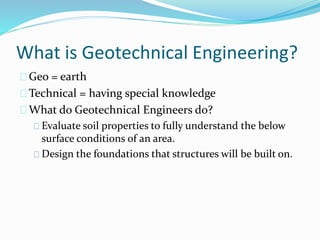Geotheta Fundamentals Explained
Geotheta Fundamentals Explained
Blog Article
About Geotheta
Table of ContentsWhat Does Geotheta Mean?9 Easy Facts About Geotheta DescribedExcitement About GeothetaThe Basic Principles Of Geotheta Some Of Geotheta

They carry out site examinations, accumulate samples, perform laboratory examinations, and assess information to assess the viability of the ground for construction tasks - Geo Tech Engineer. Based upon their findings, geotechnical designers offer suggestions for foundation layout, incline stability, retaining structures, and reduction of geotechnical hazards. They collaborate with various other specialists, such as designers, structural engineers, and construction teams, to make certain that geotechnical considerations are integrated into the general project layout and execution
By examining the behavior and residential or commercial properties of soil and rock, they can recognize prospective geotechnical dangers such as landslides, dirt settlement, or incline instability. Their know-how assists stop failures or mishaps that could threaten lives and property. Here are some thorough tasks and responsibilities of a geotechnical designer: Website Examination: Geotechnical designers conduct website investigations to gather information on subsurface problems.
They translate the data to recognize the residential properties and behavior of the soil and rock, including their strength, permeability, compaction features, and groundwater conditions. Geotechnical Evaluation and Style: Geotechnical designers evaluate the data gathered during website investigations to analyze the security and suitability of the site for building tasks. They do geotechnical calculations and modeling to evaluate factors such as bearing ability, settlement, incline security, side planet pressures, and groundwater flow.
Examine This Report about Geotheta
Structure Style: Geotechnical engineers play an essential role in making structures that can securely sustain the desired structure. They examine the dirt conditions and lots demands to identify the suitable foundation type, such as superficial foundations (e.g., grounds), deep foundations (e.g (https://www.producthunt.com/@geotheta1)., heaps), or specialized methods like dirt renovation. They think about aspects such as negotiation limits, bearing capability, and soil-structure interaction to develop ideal structure designs
They evaluate construction strategies, screen website tasks, and carry out field inspections to confirm that the design suggestions are adhered to. If unanticipated geotechnical issues arise, they assess the situation and offer referrals for remediation or adjustments to the style. Threat Evaluation and Reduction: Geotechnical designers assess geotechnical risks and dangers related to the task website, such as landslides, liquefaction, or dirt erosion.

Collaboration and Interaction: Geotechnical engineers work carefully with other professionals associated with a job, such as engineers, structural designers, and building and construction teams. Effective interaction and partnership are essential to integrate geotechnical considerations into the general task style and building and construction process. Geotechnical designers provide technical know-how, answer inquiries, and ensure that geotechnical demands are satisfied.
The Definitive Guide to Geotheta
Right here are some kinds of geotechnical engineers: Foundation Designer: Structure engineers focus on developing and assessing foundations for frameworks. They examine the dirt conditions, lots needs, and website qualities to identify one of the most appropriate foundation type and design, such as shallow structures, deep structures, or specialized techniques like stack structures.
They examine the variables influencing incline stability, such as soil buildings, groundwater conditions, and incline geometry, and develop techniques to avoid incline failures and mitigate dangers. Earthquake Engineer: Earthquake designers specialize in examining and making structures to withstand seismic pressures. They examine the seismic risk of a website, evaluate dirt liquefaction capacity, and create seismic design standards to ensure the security and durability of structures throughout earthquakes.
They carry out field screening, collect samples, and assess the gathered data to identify the soil residential properties, geologic developments, and groundwater conditions at a site. Geotechnical Instrumentation Designer: Geotechnical instrumentation designers focus on monitoring and gauging the habits of dirt, rock, and structures. They set up and preserve instrumentation systems that keep an eye on aspects such as soil negotiation, groundwater levels, slope activities, and architectural variations to examine performance and supply early cautions of prospective issues.
Not known Facts About Geotheta
They conduct tests such as triaxial tests, consolidation tests, direct shear tests, and permeability examinations to collect information for geotechnical evaluation and design. Geosynthetics Engineer: Geosynthetics designers focus on the layout and application of geosynthetic materials, such as geotextiles, geogrids, and geomembranes. They use these products to improve dirt security, reinforce inclines, offer drain services, and control disintegration.
They often tend to his response be investigatory individuals, which implies they're intellectual, introspective, and investigative. They are interested, systematic, sensible, logical, and logical. Some of them are additionally social, indicating they're kind, generous, cooperative, patient, caring, helpful, understanding, skillful, and friendly - Geo Tech Engineer.
In the workplace environment, geotechnical designers utilize specialized software devices to execute computations, develop layouts, and examine information. They prepare reports, review task requirements, interact with clients and employee, and coordinate job activities. The workplace setup supplies a helpful setting for study, evaluation, and partnership with other experts associated with the task.
Indicators on Geotheta You Need To Know
They regularly visit job sites to carry out website investigations, evaluate geotechnical problems, and gather data for evaluation. These sees involve taking a trip to different places, in some cases in remote or challenging surfaces. Geotechnical engineers might do dirt sampling, conduct tests, and display building and construction activities to ensure that the geotechnical aspects of the job are being implemented properly.
Geotechnical designers likewise function in specialized geotechnical laboratories. Geotechnical laboratory engineers function extensively in these environments, dealing with testing tools, running tools, and taping information.
Report this page